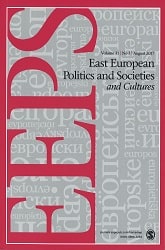Territorial Trap: Danilo Kiš, Cultural Geography, and Geopolitical Imagination
Territorial Trap: Danilo Kiš, Cultural Geography, and Geopolitical Imagination
Author(s): Zoran MilutinovićSubject(s): Cultural history, Serbian Literature, Culture and social structure , Sociology of Culture, Geopolitics
Published by: SAGE Publications Ltd
Keywords: Danilo Kiš; Pascale Casanova; world literature; republic of letters; small literatures;
Summary/Abstract: Most attempts to integrate “small,” or “minor,” or “third-world” literatures into a larger whole tend to be inadequate, deductive, and reductionist. Small literatures and their writers may crave recognition and attention, but they are not exactly helped if approached with a set of newly created stereotypes and dubious generalizations, which equate them with the geopolitical situation of their respective nations. This article focuses on Casanova’s The World Republic of Letters as an instance of this attitude towards small literatures. The article uses the example of Danilo Kiš, who figures prominently in Casanova’s book, and argues that his position within his native literary space and the place occupied by this space within world literature are misrepresented in The World Republic of Letters. This misrepresentation is not accidental: It necessarily follows from Casanova’s double mapping of this space, which is strongly influenced by geopolitical imagination and popular cultural geography. As long as the international literary space is imagined as overlapping with the space of great consecrating nations, comprising both their national as well as international writers, with the addition of international writers from the periphery “annexed” to them, the world literary map will only reproduce the (geo)political map of the world. The task of constructing a conceptual framework that will do justice to small or third-world literatures and their writers cannot be achieved so long as it is influenced by geopolitical imagination and popular cultural geography, and divides the world literature into the “first-world” and the rest.
Journal: East European Politics and Societies
- Issue Year: 28/2014
- Issue No: 04
- Page Range: 715-738
- Page Count: 24
- Language: English
- Content File-PDF

